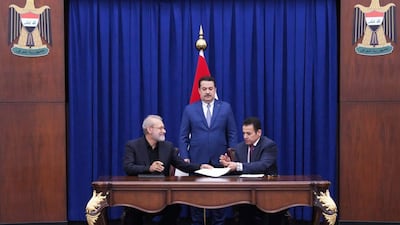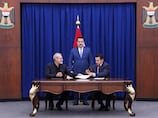A security agreement between Iran and Iraq has faced backlash from Washington, which for years has opposed Tehran's close ties with Baghdad.
The deal comes as Ali Larijani, head of Iran's Supreme National Security Council, visited Iraq on Monday amid deep divisions in the country over a proposed law that would further formalise the role of the Popular Mobilisation Forces, a coalition composed mainly of pro-Iran paramilitary groups.
Baghdad has been under pressure from Washington to rein in the Iranian-backed militias.
“We support genuine Iraqi sovereignty, not legislation that would turn Iraq into an Iranian satellite state,” US State Department spokeswoman Tammy Bruce said late on Tuesday.
She added that Washington opposes any deal that is inconsistent with US goals and that would “counter” its efforts to strengthen state institutions in Iraq. “We’ve been clear, in this particular instance certainly and others, that the future of nations should be in the hands of the people of those nations,” she said.
“Our commitment here, as we’ve made clear, this particular dynamic runs counter to what our commitment has been regarding security in general."
In response, Iran's embassy in Baghdad described the comments made by Washington as "interfering remarks". The statements reflect “ongoing efforts by American decision-makers to sow division among neighbouring and Muslim people", the embassy said in a statement published by Iranian media. The embassy also reaffirmed the “shared determination” of Iran and Iraq to deepen relations based on mutual respect.
Iraq's embassy in Washington said on Wednesday that Baghdad has the right to independently draw up agreements with any sides. Iraq “has the right to enter into agreements in accordance with its constitution and national laws, in a manner consistent with its supreme interests", state news reported.
The country is "not subordinate to the policies of any other state" and Baghdad's actions are based on its “independent national will”, the statement added.
What is the deal about?
The agreement signed on Monday aims to tighten border security co-operation between Iran and Iraq. A statement from the office of Iraq's National Security Adviser, Qasim Al Araji, said he held talks with Mr Larijani on the implementation of the agreement, as well as Israel's war on Gaza.
The office of Iraqi Prime Minister Mohammed Shia Al Sudani said in a statement that he oversaw the signing of the deal.
The agreement is a continuation of a pact made in March 2023 to increase security in the Iraqi Kurdistan region, which Tehran accuses of harbouring armed opposition groups. Officials in Baghdad have said the agreement aims to curb cross-border infiltration by Kurdish groups that Iran says has caused unrest.
"Iraq has a security protocol with the Islamic Republic of Iran, signed on March 19, 2023, known as the Joint Security Agreement on border security and the specific measures to neutralise the Iranian Kurdish opposition present in the Kurdistan Region," said a statement given to The National by Mr Al Sudani's office.
"The coordination was carried out to convert this security protocol, or memorandum of understanding (MoU), to the same content regarding border security, security cooperation, and matters related to the Iranian Kurdish opposition and its five parties," said the statement.
Iran suffered blows during a 12-day war with Israel in which the US also launched attacks on its major nuclear sites.
How green is the expo nursery?
Some 400,000 shrubs and 13,000 trees in the on-site nursery
An additional 450,000 shrubs and 4,000 trees to be delivered in the months leading up to the expo
Ghaf, date palm, acacia arabica, acacia tortilis, vitex or sage, techoma and the salvadora are just some heat tolerant native plants in the nursery
Approximately 340 species of shrubs and trees selected for diverse landscape
The nursery team works exclusively with organic fertilisers and pesticides
All shrubs and trees supplied by Dubai Municipality
Most sourced from farms, nurseries across the country
Plants and trees are re-potted when they arrive at nursery to give them room to grow
Some mature trees are in open areas or planted within the expo site
Green waste is recycled as compost
Treated sewage effluent supplied by Dubai Municipality is used to meet the majority of the nursery’s irrigation needs
Construction workforce peaked at 40,000 workers
About 65,000 people have signed up to volunteer
Main themes of expo is ‘Connecting Minds, Creating the Future’ and three subthemes of opportunity, mobility and sustainability.
Expo 2020 Dubai to open in October 2020 and run for six months
UAE currency: the story behind the money in your pockets
The major Hashd factions linked to Iran:
Badr Organisation: Seen as the most militarily capable faction in the Hashd. Iraqi Shiite exiles opposed to Saddam Hussein set up the group in Tehran in the early 1980s as the Badr Corps under the supervision of the Iran Revolutionary Guards Corps (IRGC). The militia exalts Iran’s Supreme Leader Ali Khamenei but intermittently cooperated with the US military.
Saraya Al Salam (Peace Brigade): Comprised of former members of the officially defunct Mahdi Army, a militia that was commanded by Iraqi cleric Moqtada Al Sadr and fought US and Iraqi government and other forces between 2004 and 2008. As part of a political overhaul aimed as casting Mr Al Sadr as a more nationalist and less sectarian figure, the cleric formed Saraya Al Salam in 2014. The group’s relations with Iran has been volatile.
Kataeb Hezbollah: The group, which is fighting on behalf of the Bashar Al Assad government in Syria, traces its origins to attacks on US forces in Iraq in 2004 and adopts a tough stance against Washington, calling the United States “the enemy of humanity”.
Asaeb Ahl Al Haq: An offshoot of the Mahdi Army active in Syria. Asaeb Ahl Al Haq’s leader Qais al Khazali was a student of Mr Al Moqtada’s late father Mohammed Sadeq Al Sadr, a prominent Shiite cleric who was killed during Saddam Hussein’s rule.
Harakat Hezbollah Al Nujaba: Formed in 2013 to fight alongside Mr Al Assad’s loyalists in Syria before joining the Hashd. The group is seen as among the most ideological and sectarian-driven Hashd militias in Syria and is the major recruiter of foreign fighters to Syria.
Saraya Al Khorasani: The ICRG formed Saraya Al Khorasani in the mid-1990s and the group is seen as the most ideologically attached to Iran among Tehran’s satellites in Iraq.
(Source: The Wilson Centre, the International Centre for the Study of Radicalisation)
Results
2pm: Maiden (TB) Dh60,000 (Dirt) 1,200m, Winner: Mouheeb, Tom Marquand (jockey), Nicholas Bachalard (trainer)
2.30pm: Handicap (TB) Dh68,000 (D) 1,200m, Winner: Honourable Justice, Royston Ffrench, Salem bin Ghadayer
3pm: Handicap (TB) Dh84,000 (D) 1,200m, Winner: Dahawi, Antonio Fresu, Musabah Al Muhairi
3.30pm: Conditions (TB) Dh100,000 (D) 1,200m, Winner: Dark Silver, Fernando Jara, Ahmad bin Harmash
4pm: Maiden (TB) Dh60,000 (D) 1,600m, Winner: Dark Of Night. Antonio Fresu, Al Muhairi.
4.30pm: Handicap (TB) Dh68,000 (D) 1,600m, Winner: Habah, Pat Dobbs, Doug Watson
The%20specs
%3Cp%3E%3Cstrong%3EEngine%3A%20%3C%2Fstrong%3E77kWh%202%20motors%0D%3Cbr%3E%3Cstrong%3EPower%3A%20%3C%2Fstrong%3E178bhp%0D%3Cbr%3E%3Cstrong%3ETorque%3A%20%3C%2Fstrong%3E410Nm%0D%3Cbr%3E%3Cstrong%3ERange%3A%20%3C%2Fstrong%3E402km%0D%3Cbr%3E%3Cstrong%3EPrice%3A%20%3C%2Fstrong%3EDh%2C150%2C000%20(estimate)%0D%3Cbr%3E%3Cstrong%3EOn%20sale%3A%20%3C%2Fstrong%3ETBC%3C%2Fp%3E%0A
CHATGPT%20ENTERPRISE%20FEATURES
%3Cp%3E%E2%80%A2%20Enterprise-grade%20security%20and%20privacy%3C%2Fp%3E%0A%3Cp%3E%E2%80%A2%20Unlimited%20higher-speed%20GPT-4%20access%20with%20no%20caps%3C%2Fp%3E%0A%3Cp%3E%E2%80%A2%20Longer%20context%20windows%20for%20processing%20longer%20inputs%3C%2Fp%3E%0A%3Cp%3E%E2%80%A2%20Advanced%20data%20analysis%20capabilities%3C%2Fp%3E%0A%3Cp%3E%E2%80%A2%20Customisation%20options%3C%2Fp%3E%0A%3Cp%3E%E2%80%A2%20Shareable%20chat%20templates%20that%20companies%20can%20use%20to%20collaborate%20and%20build%20common%20workflows%3C%2Fp%3E%0A%3Cp%3E%E2%80%A2%20Analytics%20dashboard%20for%20usage%20insights%3C%2Fp%3E%0A%3Cp%3E%E2%80%A2%20Free%20credits%20to%20use%20OpenAI%20APIs%20to%20extend%20OpenAI%20into%20a%20fully-custom%20solution%20for%20enterprises%3C%2Fp%3E%0A
More from Rashmee Roshan Lall
more from Janine di Giovanni
Why seagrass matters
- Carbon sink: Seagrass sequesters carbon up to 35X faster than tropical rainforests
- Marine nursery: Crucial habitat for juvenile fish, crustations, and invertebrates
- Biodiversity: Support species like sea turtles, dugongs, and seabirds
- Coastal protection: Reduce erosion and improve water quality
The Vile
Starring: Bdoor Mohammad, Jasem Alkharraz, Iman Tarik, Sarah Taibah
Director: Majid Al Ansari
Rating: 4/5
The five pillars of Islam



